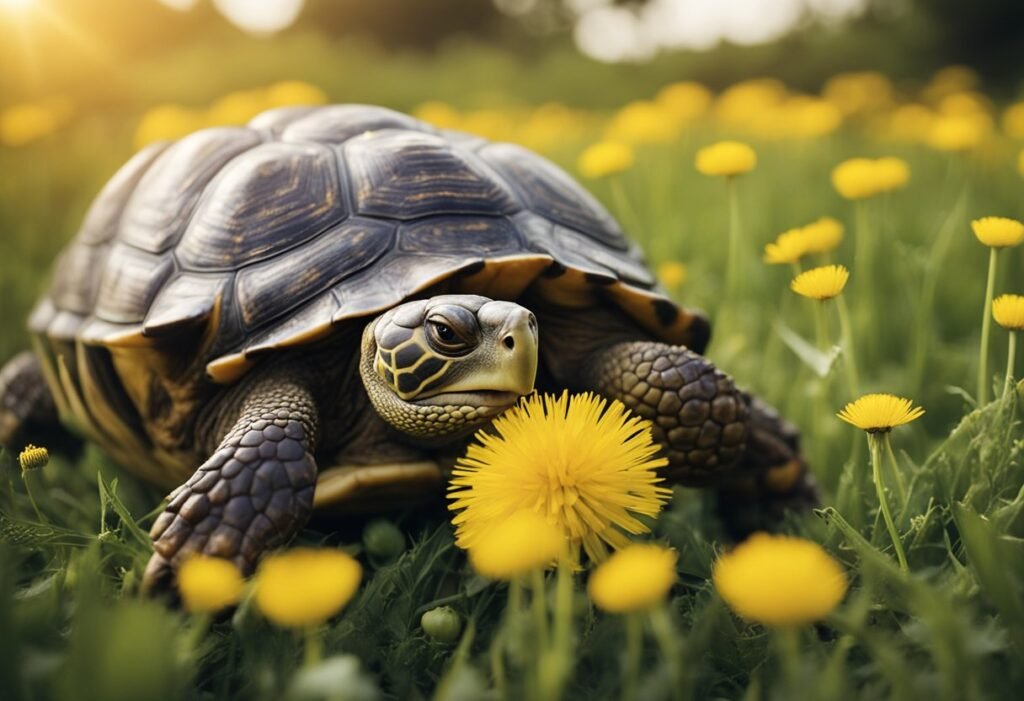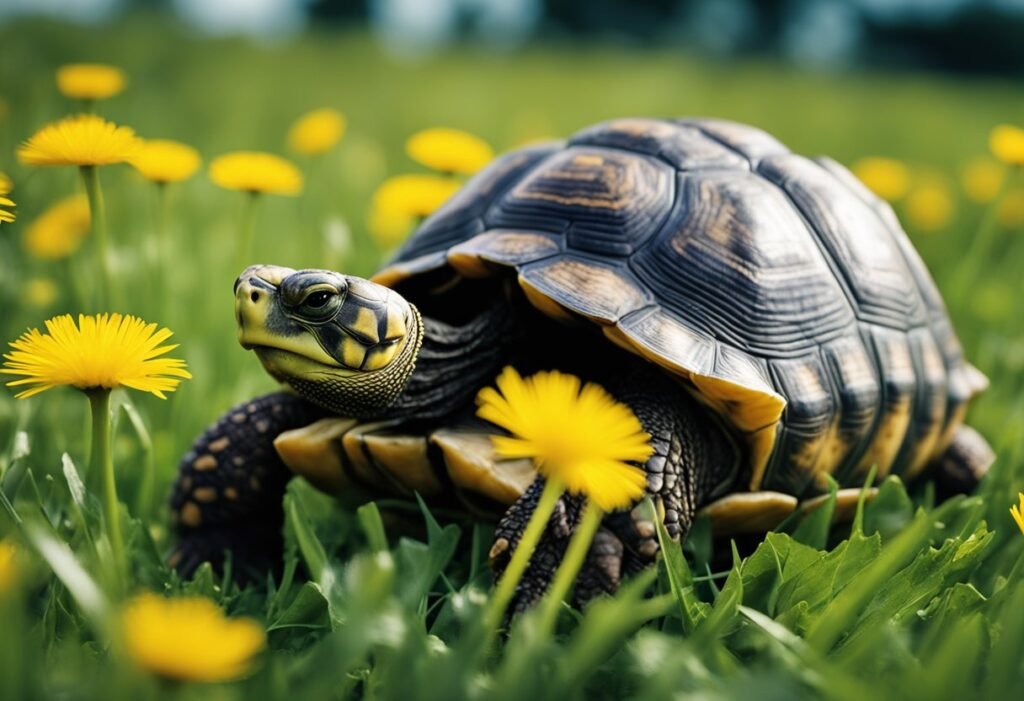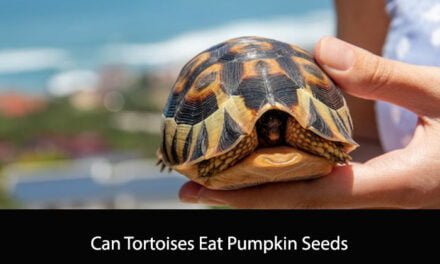Tortoises are fascinating creatures that make great pets. They are herbivorous and enjoy a variety of plants. However, not all plants are safe for them to eat. One question that often arises is whether tortoises can eat dandelions.
Dandelions are a common weed found in many gardens and yards. They are known for their bright yellow flowers and fluffy white seed heads. While some people may consider them a nuisance, others may see them as a valuable source of food for their pets. But can tortoises eat dandelions? In short, the answer is yes. Dandelions are safe for tortoises to eat and can even provide some nutritional benefits. However, there are some things to keep in mind before feeding them to your pet.
Tortoises and Their Diet

Tortoises are herbivorous animals that require a diet rich in fiber, vitamins, and minerals to maintain their health. In the wild, they primarily feed on grasses, weeds, and leafy greens. However, as pets, they may also be fed a variety of fruits and vegetables.
It is essential to provide a well-balanced diet to your tortoise to avoid any nutritional deficiencies or health issues. A diet that is too high in protein or fat can cause serious health problems, including shell deformities and organ damage.
When it comes to feeding dandelions to your tortoise, it is safe to do so in moderation. Dandelions are a good source of fiber, vitamins A and C, and potassium. However, they should not be the only food source for your tortoise.
It is essential to ensure that the dandelions are free from pesticides and other harmful chemicals before feeding them to your tortoise. Also, avoid feeding them dandelions that have been sprayed with herbicides or pesticides.
In conclusion, dandelions can be a healthy addition to your tortoise’s diet, but they should not be the only food source. A well-balanced diet that includes a variety of leafy greens, vegetables, and fruits is essential for your tortoise’s health and well-being.
Understanding Dandelions

Dandelions are common yellow-flowered plants found in many parts of the world. They are considered a weed by many people and can be found in lawns, gardens, and other areas where they are not wanted.
Despite their reputation as a weed, dandelions are actually quite nutritious and have been used for medicinal purposes for centuries. They are high in vitamins A, C, and K, as well as minerals such as calcium, iron, and potassium.
Dandelions are also rich in antioxidants and have been shown to have anti-inflammatory properties. Some studies have even suggested that dandelion extract may have anti-cancer properties, although more research is needed to confirm this.
When it comes to tortoises, dandelions can be a great addition to their diet. They are low in calories and high in fiber, which can help keep your tortoise’s digestive system healthy. However, it’s important to note that dandelions should be fed in moderation, as too much can cause digestive upset.
In summary, dandelions are a nutritious plant that can be beneficial for both humans and animals. While they may be considered a weed by some, they can be a valuable addition to your tortoise’s diet when fed in moderation.
Can Tortoises Eat Dandelions?
Dandelions are a common weed that grows in many parts of the world. They are often considered a nuisance in gardens and lawns, but did you know that they can also be a nutritious food source for tortoises?
Tortoises are herbivores and require a diet that is high in fiber and low in protein. Dandelions are a good source of both fiber and vitamins, making them a great addition to a tortoise’s diet.
However, it’s important to note that not all parts of the dandelion plant are safe for tortoises to eat. The leaves and flowers are safe and nutritious, but the roots and stems can be harmful. They contain a milky sap that can cause digestive issues and even be toxic in large quantities.
When feeding dandelions to your tortoise, it’s important to only offer the leaves and flowers. You should also avoid feeding them dandelions that have been treated with pesticides or other chemicals.
In conclusion, dandelions can be a healthy addition to a tortoise’s diet, but only if fed in moderation and without the roots and stems. Always consult with a veterinarian or other reptile expert before making any significant changes to your tortoise’s diet.
Health Benefits of Dandelions for Tortoises
Dandelions are one of the most common weeds found in gardens and fields. While they may be considered a nuisance by many, they can actually provide several health benefits to tortoises.
Nutritional Value
Dandelions are a great source of nutrition for tortoises. They are high in fiber, which is essential for maintaining a healthy digestive system. They also contain vitamins A, C, and K, as well as minerals such as calcium and iron. These nutrients help to support the overall health and well-being of tortoises.
Hydration Source
In addition to their nutritional value, dandelions can also provide a source of hydration for tortoises. Dandelions have a high water content, which can help to keep tortoises hydrated, especially during hot weather.
Overall, dandelions can be a great addition to a tortoise’s diet. However, it is important to ensure that they are sourced from a safe location, free from pesticides and other harmful chemicals. As with any new food, it is also important to introduce dandelions gradually to avoid any digestive upset.
Potential Risks of Dandelions for Tortoises

Dandelions are a common food item for tortoises, but they may pose potential risks. Here are a few things to keep in mind when feeding dandelions to your tortoise.
Pesticide Exposure
Dandelions that are grown in areas treated with pesticides can be harmful to tortoises. Pesticides can be toxic and may cause serious health problems for your tortoise. It’s essential to ensure that the dandelions you feed your tortoise are free of pesticides.
Overfeeding Issues
While dandelions are a nutritious food source, overfeeding can lead to issues. Overfeeding dandelions can cause digestive problems, such as diarrhea, and may lead to obesity. It’s crucial to feed your tortoise a balanced diet that includes a variety of foods.
To prevent overfeeding, you can limit the amount of dandelions you offer your tortoise. As a general rule, dandelions should make up no more than 10% of your tortoise’s diet.
In conclusion, while dandelions can be a healthy food option for tortoises, it’s essential to be aware of the potential risks. By ensuring that the dandelions are free of pesticides and feeding them in moderation, you can provide your tortoise with a nutritious and safe diet.
How to Feed Dandelions to Tortoises
When it comes to feeding tortoises, it is important to provide them with a balanced diet that includes a variety of greens and vegetables. Dandelions are one of the many foods that tortoises can eat, and they are a great source of vitamins and minerals.
Preparation
Before feeding dandelions to your tortoise, it is important to properly prepare them. Here are the steps you should follow:
- Wash the dandelions thoroughly to remove any dirt or debris.
- Remove the stems and any wilted or yellow leaves.
- Chop the dandelion leaves into small pieces to make them easier for your tortoise to eat.
Feeding Frequency
While dandelions are a healthy addition to your tortoise’s diet, it is important to feed them in moderation. Here are some guidelines to follow:
- Offer dandelions as a treat, rather than a staple food.
- Feed dandelions no more than once or twice a week.
- Monitor your tortoise’s weight and adjust their diet accordingly.
Overall, dandelions can be a nutritious and tasty addition to your tortoise’s diet when fed in moderation. Remember to always provide a variety of foods to ensure your tortoise is getting all the nutrients they need.
Alternatives to Dandelions in Tortoise Diet
When it comes to feeding tortoises, dandelions are a popular choice. However, there are other options that can provide the same nutrients and benefits. Here are some alternatives to dandelions that can be included in a tortoise’s diet:
1. Collard Greens
Collard greens are a great source of calcium, vitamin A, and vitamin K, making them a great alternative to dandelions. They also have a high fiber content, which can help with digestion. It’s important to note that collard greens should be fed in moderation as they contain goitrogens, which can interfere with the thyroid gland’s function in large amounts.
2. Endive
Endive is another leafy green that can be included in a tortoise’s diet. It’s low in oxalates, making it a great source of calcium, and also contains vitamins A and C. Endive has a slightly bitter taste, so it may take some time for a tortoise to get used to it.
3. Hibiscus Flowers
Hibiscus flowers are a great source of antioxidants and can also help with digestion. They have a slightly sweet taste, which can make them a great treat for tortoises. It’s important to note that hibiscus flowers should be fed in moderation as they have a high phosphorus content.
4. Squash
Squash is a great source of vitamins A and C, as well as fiber. It can be fed to tortoises raw or cooked, and can be a great addition to their diet. However, it’s important to note that some varieties of squash, such as acorn squash, have a high oxalate content and should be fed in moderation.
Overall, there are many alternatives to dandelions that can provide the same nutrients and benefits. By including a variety of foods in a tortoise’s diet, you can ensure that they are getting all the vitamins and minerals they need to stay healthy.
Frequently Asked Questions

What flowers are safe for tortoises to eat?
Tortoises can eat a variety of flowers, but it’s important to make sure they are safe for them to consume. Some safe flowers for tortoises to eat include hibiscus, roses, dandelions, and pansies. However, it’s important to avoid flowers that have been treated with pesticides or other chemicals.
What weeds are safe for tortoises to eat?
Tortoises can also eat certain weeds, but again, it’s important to make sure they are safe for them to consume. Safe weeds for tortoises to eat include clover, plantain, and dandelions. However, it’s important to avoid weeds that have been treated with pesticides or other chemicals.
Can red footed tortoises eat dandelion flowers?
Yes, red footed tortoises can eat dandelion flowers. In fact, dandelions are a great source of nutrition for tortoises as they are high in fiber, vitamins, and minerals.
Can Hermann tortoises eat dandelion flowers?
Yes, Hermann tortoises can eat dandelion flowers. Like red footed tortoises, dandelions are a great source of nutrition for Hermann tortoises.
Can sulcata tortoises eat dandelion flowers?
Yes, sulcata tortoises can eat dandelion flowers. Dandelions are a safe and nutritious food for sulcata tortoises, but it’s important to make sure they are not consuming too many as they can be high in oxalates.
Are dandelions toxic to pets?
Dandelions are not toxic to pets, including dogs and cats. In fact, some pets enjoy eating dandelions and they can even provide health benefits such as aiding in digestion. However, it’s important to make sure the dandelions have not been treated with pesticides or other chemicals.





